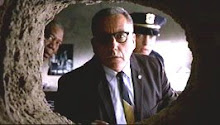Transcript of remarks on "Meet the Press" appearance by Michigan Senator George B. McClellan, chairman of the Senate Armed Services Committee, as conveyed by telegraph from NBC's Washington bureau ...
Tim Russert (voiceover intro): our issues this Sunday ... staggering carnage on the battlefield ... rioting in northern cities ... growing resistance to the war among Democrats .... all with no end in sight ... with us today, a man who knows the horrors of war far better than anyone, the former Union general challenging President Abraham Lincoln in next year's election, the Honorable George B. McClellan. Welcome, Senator McClellan, and thank you for taking time from your busy campaign.
McClellan: You are most welcome, sir, but I would appreciate if you would kindly address me as "General."
Russert: By all means, my apologies. General McClellan, you've introduced a resolution in the Senate that would limit the president's ability to wage war. Why?
McClellan: It's obvious to all but the most oblivious that this war is going quite badly - thousands of our soldiers dead, vast devastation and ruin, the military strained beyond its capacity, growing discontent at home - all based on an illegal and dishonest rationale for halting Southern secession. In fact, our revered Constitution makes no mention of secession, as even a backwoods lawyer like Lincoln is surely aware.
Russert: Are you saying, Sena ... sorry, General ... that ending slavery can be achieved without force of arms?
McClellan: What I am saying with crystal clarity is that the Confederacy is a separate, sovereign nation not beholden to the simplistic whims of another nation's autocrat. What the South does within its borders is its business, as with the North. Is there a whit of difference between the so-called slavery of the South and the brutality of child labor in Northern mills? Not that I can see. All Lincoln has succeeded in doing is to put our soldiers in the middle of a civil war.
Russert: But would you not agree that the South provoked the conflict with its attack on the federal military post at Fort Sumter?
McClellan: I strenuously disagree with the premise of your question, sir. It has never been proven that the honorable leaders of the Confederacy -- and they are all honorable men -- had anything to do with that attack. From what I understand, it was undertaken by 19 freedom fighters armed with primitive weaponry and acting at the behest of a renegade leader with no connection to the Confederacy. Lincoln has used this flimsy pretext to wage a massive invasion of the South, conscript thousands against their will, suspend habeus corpus - even toss journalists like you into jail for asking impertinent questions!
Russert (a tad nervously): What about the fate of millions of slaves in the South -- would not a Union retreat from the battlefield consign them to lives of misery?
McClellan: How convenient of Mr. Lincoln that he keeps changing the rationale for the war. First we were told it was needed to maintain the Union, then to counter alleged Southern aggression, then to liberate these so-called slaves. What next, to provide voting rights for women? And how anyone can claim this war has helped the people it was supposed to liberate is beyond me.
Russert: How then would you resolve the issue of slavery, which has haunted us since the Revolution?
McClellan: By the most forceful and strenuous of negotiations, sir, and not just with the Confederacy but with Britain, France, Spain and Mexico, all of whom are inclined to act in our best interests. Once we take this long-overdue strategy, it will clearly signal to the world that the Union is not to be trifled with ...
Subscribe to:
Post Comments (Atom)





No comments:
Post a Comment